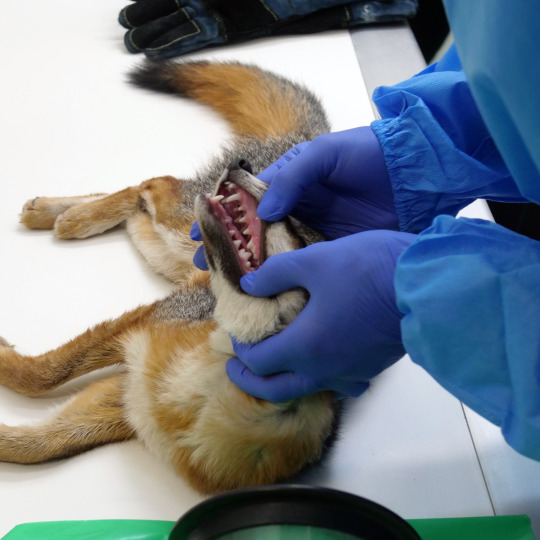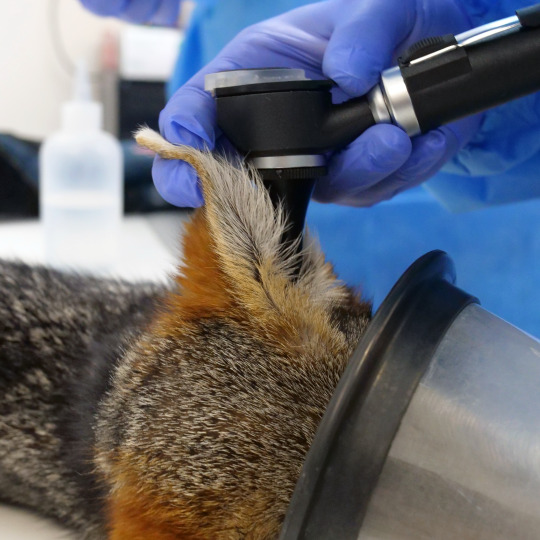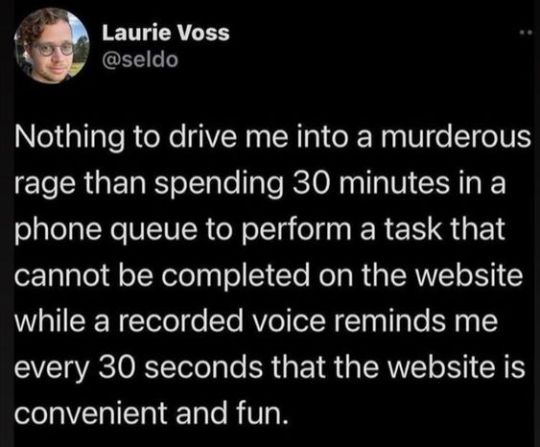#wwcc
Explore tagged Tumblr posts
Text
Not all loon noises are haunting and regal. Sometimes, they just "wuak"
2 notes
·
View notes
Text
I need to stop looking at volunteer opportunities that are not feasible for me, as much as I'd like to be helping queer youth and foster kids in some small way.
#i should focus on getting better first before i try to help others#and maybe get my drivers licence. so many of these things require you to have a licence as well as a WWCC#working on that though. but i haven't heard from my support worker in a while. i should text her.#skylark prive
9 notes
·
View notes
Text
God
WRITERS
If you see this, spoil your WIP's biggest plot twist using ONLY ONE WORD
Here's mine!
Dying
6K notes
·
View notes
Text
very interesting that i can just lie and change the date of my wwcc and nesa doesn't think anything of it. seems like a very strange security issue to have actually
#im literally just waiting for the new wwcc number to come through tho like i will fix this#im not a total asshole#i did it to see if it would just accept the old wwcc number w a new date and surpriiiiise shawty
0 notes
Text
ArtFight Character: Dakota McNamara



New ref sheet for Dakota! It had been a minute since I drew him so I wanted to give him an update for ArtFight.
Attack him here:
Dakota (He/Him, 26) is a character I'm playing in an upcoming TTRPG campaign inspired by The Magnus Archives. He's the newest recruit/ case study at an American branch of the institute.
Kota has seen what he can only describe as ghosts for as long as he can remember. These ghosts never spoke, moved, or did anything other than stare blankly into the middle distance. This drove him to going to college [Western Wisconsin CC] to study parapsychology. In November of his second year at WWCC he witnessed one of these ghosts attacking, and eventually killing, his roommate: Jaxon Connors. Initially considered a suspect, Dakota was interrogated and found innocent. Noone believed his story of the poltergeist, instead calling it stress induced hysteria.
#art#digital art#digital drawing#krita#gay#gay art#ttrpg#ttrpg art#tma#tma oc#tma oc art#the magnus archives#oc#oc art#artfight#artfight ref#artfight 2025#queer#thecouchmimic art
4 notes
·
View notes
Text
youtube
Excerpt from this Smithsonian story:
Several hundred starving, sick or injured brown pelicans have turned up on beaches throughout California over the past few weeks, with wildlife officials still unable to pinpoint the cause of what they are calling a “crisis.”
The California Department of Fish and Wildlife (CDFW), along with the U.S. Fish and Wildlife Service (USFWS) and other non-governmental partners, have been working to collect and rehabilitate the birds, many of which are anemic, dehydrated and underweight.
“They’re in really poor physical shape. They’re starving, and they haven’t gotten enough nutrition,” Russ Curtis, a spokesperson for the nonprofit organization International Bird Rescue, which is helping in the rescue efforts, tells KQED’s Annelise Finney.
“When there’s not the fishing stock that they can find, they take chances around fishing piers and fishing boats and places where there are people with fishing tackle,” Curtis says, explaining that some pelicans have been hurt by fishing hooks and lines they encounter near the shore.
As of this week, the Wetlands and Wildlife Care Center (WWCC) in Huntington Beach and Santa Barbara Wildlife Care Network have admitted more than 100 pelicans each, while International Bird Rescue has taken 260 pelicans into its two California facilities—one in Los Angeles County, and one in the San Francisco Bay Area, reports Cheri Carlson of the Ventura County Star.
Other birds have been found dead on beaches. Necropsies have revealed starvation as their cause of death, which has puzzled scientists. Populations of fish that pelican forage, by all accounts, remain abundant off the Pacific coast.
We also know that there’s supposedly plenty of anchovies and their food out there in the ocean, so we don’t really know why they are not able to forage yet,” Debbie McGuire, executive director of the Wetlands and Wildlife Care Center, tells Eugene Garcia of theAssociated Press.
Brown pelicans are known to spend their non-breeding months throughout the entirety of the state’s coastline, and the sick birds have been found in a variety of locations. In northern California, most birds have been rescued around Monterey and Santa Cruz, while those in southern California have been found by officials in a variety of traditional and non-traditional habitats. Two dozen pelicans were found on Newport Beach and dozens more were picked up around Huntington Beach—but sick birds have also been identified in a lake at SoFi stadium, the home of the NFL’s Los Angeles Rams, and at a Malibu fire station, the Guardian’sDani Anguiano reports.In rescue efforts, the first step is to support the birds with warmth. “The great news is the vast majority are recovering if we can get them through those first couple of critical hours of hypothermia,” Elizabeth Wood, the WWCC’s veterinarian and medical director, says in a video posted to Facebook.
11 notes
·
View notes
Text
airbus a340-600 reg. F-WWCC. Picture most likely taken from its maiden flight.


#took me a while 2 find an omage for this bcs sometime between the first flight and the second flight they added the words ig?#in a lot of the images those words are missing
9K notes
·
View notes
Text




A Fox's Tale: Patient 25-307 came to us after being attacked by a coyote. He escaped! Only to fall into a pool. He clambered out! Only to fall into a hot tub. By the time this little Gray Fox made it to our care, he was a little injured, a lot wet, and very upset with the situation. He received a full exam, including a close-up look at his baby teeth, deep into his ear canals, and at his tiny paws. There was a foxtail stuck in his ear, which our veterinarian removed with alligator forceps, and he had abrasions from the coyote encounter. He's resting up now, and we can report that he LOVES apples. Send him your good vibes for a speedy recovery!
2 notes
·
View notes
Text
OK GUYS, so sorry for disappearing for a while, but I was working very very hard on finishing this first draft before October and I am very pleased to say
I HAVE SUCCEEDED

at 144k.... I have finished the first draft of When White Crows Cry.....I'm gonna cry myself LMAO
no but actually, this is huge for me, and I am genuinely really really proud of myself 🥹🥹🥹 I know there's still a LONG way ahead of me, but this is a big step completed, and I'm super happy about it :'))
because I'm feeling nice today, here's the last line >:))

hehe
#writeblr#wwcc wip#OK I'M GONNA BE MORE ACTIVE NOW I PROMISE#especially since i am not gonna be writing for. a while hghghh#setting this aside until nanowrimo#omg that's gonna be hard to wait out aaaaaa
124 notes
·
View notes
Text
IF THIS WAS NOT ME YESTERDAY WAITING 2 AND A HALF HOURS ON CALL TO SIMPLY SWITCH AROUND A COUPLE OF LETTERS IN MY NAME ON A DOCUMENT SO I CAN APPLY FOR A WWCC SINCE MY DOCUMENTS DIDNT MATCH UP BECAUSE OF THOSE TWO. MISPLACED. LETTERS IN MY NAME 😭😭😭

33K notes
·
View notes
Text
1945 den 2025 ve Sonrası Dönem Dönem ABD C2 Sistemleri
https://www.defencetrend.com/?p=22696 ❝1945 den 2025 ve Sonrası Dönem Dönem ABD C2 Sistemleri❞ ➡️ Haberin detayları için: https://www.defencetrend.com/?p=22696 www.defencetrend.com ❤️Beğen | ✨Takip Et | 👍Paylaş #ABMS #CBC2 #FAADC2 #GCCS #IBCS #Replicator #SSC2 #WWCCS #defencetrend #savunmahaber #savunmasanayi #haber
0 notes
Text
How to Find Rewarding Daycare Jobs: Your Guide to a Career with Purpose
Are you passionate about working with children and shaping the next generation? If so, searching for daycare jobs might just be the perfect career path for you. At NextGen Montessori, we believe that childcare is more than just supervision—it’s an opportunity to inspire, nurture, and educate.

Why Choose a Career in Childcare?
Working in a daycare setting is incredibly rewarding. You get to witness the milestones of a child’s development, like their first words, first steps, and first friendships. At NextGen Montessori, our educators are mentors who guide children through Montessori++ learning, which includes traditional Montessori methods combined with robotics, coding, and STEM activities.
Every day is unique. You might start with circle time, help with sensory activities, assist in robotics projects, and end the day with storytelling. It’s hands-on, dynamic, and deeply impactful.
What You Need to Start
To work in daycare jobs like those at NextGen Montessori, you typically need:
Working with Children Check (WWCC)
First Aid Certification
Early Childhood Education Certificate or Diploma
A passion for working with children and supporting their growth
We also value those with a willingness to learn, patience, and a caring spirit. At NextGen Montessori, we provide ongoing training and support to help you grow in your role.
The Benefits of Joining NextGen Montessori
When you join our team, you’re not just getting a job—you’re joining a community that values growth and learning. Our educators benefit from:
✅ Supportive Learning Environment
✅ Ongoing Training and Career Development
✅ Inclusive Community Events
✅ Hands-On Learning with Montessori++
Our Truganina centre is also easily accessible from Tarneit, Williams Landing, and nearby suburbs, making your commute easier and more convenient.
Ready to Make a Difference?
If you’re searching for daycare jobs that are more than just a paycheck, join us at NextGen Montessori. Be a part of a community that believes in nurturing young minds and preparing them for the future.🌟 Apply today and start your journey in transformative early education!
#childcare#truganina#nextgen montessori#childcare centre in truganina#best childcare in truganina#daycare jobs#jobs at childcare
0 notes
Text
Unlocking Opportunities: Your Complete Guide to CHC30121 Certificate III in Early Childhood Education and Care

In a world where nurturing young minds shapes the future, pursuing a career in early childhood education is both fulfilling and impactful. The CHC30121 Certificate III in Early Childhood Education and Care is your gateway to this rewarding field, equipping you with essential skills to support the growth and development of children from birth to age five. This comprehensive guide is designed to illuminate every step of the journey—from understanding course requirements and practical placements to exploring job prospects. Whether you’re a passionate caregiver or looking to make a difference in your community, this certificate forms the cornerstone of your professional growth. Unlock new opportunities today as we delve into everything you need to know to embark on this exciting path in early childhood education and care.
Importance of Early Childhood Education Early childhood education is a critical foundation for lifelong learning and development. During the first five years of life, a child's brain undergoes rapid growth, making these formative years crucial for cognitive, emotional, social, and physical development. Quality early childhood education programs provide a structured environment where children can explore, discover, and learn through play, which is essential for fostering creativity and critical thinking skills. Beyond academic preparation, early childhood education helps in developing essential life skills such as communication, problem-solving, and emotional regulation. Children learn to interact with their peers, navigate social situations, and develop empathy and respect for others. These experiences lay the groundwork for building strong interpersonal relationships and becoming well-rounded individuals. Moreover, investing in early childhood education has significant long term benefits for society. Research shows that children who attend high-quality early education programs are more likely to perform better in school, graduate from high school, and pursue higher education. They are also less likely to engage in criminal activities and are more likely to contribute positively to the community. Thus, early childhood education is not just about individual growth but also about creating a better, more equitable society.
Admission Requirements for CHC30121 To enroll in the CHC30121 Certificate III in Early Childhood Education and Care, prospective students must meet certain admission requirements. While these requirements may vary slightly between institutions, there are some common criteria that applicants are generally expected to fulfill. Firstly, applicants must have completed at least Year 10 or its equivalent in terms of secondary education. This ensures that they have a basic educational foundation necessary for undertaking the course materials. In addition to educational prerequisites, many training providers may require applicants to undergo a Working with Children Check (WWCC) and a National Police Check. These checks are crucial for ensuring the safety and wellbeing of children, as they verify that applicants do not have any criminal history that could pose a risk in a childcare setting. It's important for prospective students to be aware of these requirements and ensure they can meet them before applying. Some institutions may also conduct an interview or require applicants to submit a personal statement outlining their interest in early childhood education and their career goals. This helps training providers assess the applicant's suitability for the course and their commitment to pursuing a career in this field. By meeting these admission requirements, prospective students can take the first step towards embarking on a rewarding journey in early childhood education.
Conclusion and Next Steps for Aspiring Educators In conclusion, the CHC30121 Certificate III in Early Childhood Education and Care is a valuable qualification that opens up numerous opportunities for individuals passionate about working with young children. This comprehensive guide has provided insights into the importance of early childhood education, the key learning outcomes of the certificate, admission requirements, course structure, and career opportunities. By pursuing this qualification, you can embark on a rewarding career that makes a meaningful difference in the lives of young children and their families. For aspiring educators, the next steps involve researching and selecting a reputable training provider that offers the CHC30121 certificate. Consider factors such as course delivery methods, practical placement opportunities, and support services provided by the institution. Once you have chosen a training provider, complete the application process and prepare for an exciting journey of learning and professional growth. As you embark on this path, remember to stay committed to your goals and continuously seek opportunities for professional development. The field of early childhood education is dynamic and ever-evolving, and staying updated with best practices and new research is essential for providing high-quality care and education. With dedication, passion, and the right qualifications, you can unlock new opportunities and make a positive impact on the future generation.
#CHC30121 Certificate III of Early Childhood Education and Care#CHC43121 Certificate IV in Disability Support#CHC50121 Diploma of Early Childhood Education and Care
0 notes
Text
NDIS Disability Support Worker: Enhancing Lives Through Compassionate Care
The National Disability Insurance Scheme (NDIS) plays a crucial role in providing individuals with disabilities the support they need to lead independent and fulfilling lives. At the heart of this initiative are NDIS disability support worker, who provide essential care, assistance, and companionship to participants. Whether in homes, community settings, or care facilities, these professionals are vital in ensuring that people with disabilities receive the right level of support tailored to their needs.
What is an NDIS Disability Support Worker?
An NDIS disability support worker is a trained professional who assists NDIS participants in their daily lives. Their role varies depending on the specific needs of the individual but can include personal care, social support, mobility assistance, and help with household tasks.
These professionals work in various settings, such as:
Private homes
Group homes
Community centers
Educational institutions
Disability support organizations
Responsibilities of an NDIS Disability Support Worker
The role of an NDIS disability support worker goes beyond just providing care. They help NDIS participants achieve their goals, promote independence, and enhance overall well-being. Some of the key responsibilities include:
1. Personal Care Assistance
Helping with daily hygiene tasks such as bathing, grooming, and dressing.
Assisting with toileting and continence management.
Supporting individuals with mobility and transferring from one place to another.
2. Household Support
Helping with cooking, cleaning, and other household chores.
Assisting with grocery shopping and meal preparation.
Ensuring the living environment is safe and accessible.
3. Social and Community Participation
Accompanying participants to social events and activities.
Encouraging community involvement and building social connections.
Supporting clients in recreational activities such as sports, hobbies, and outings.
4. Transport Assistance
Helping participants travel to medical appointments, work, or community activities.
Providing guidance and support for using public transportation.
5. Health and Well-being Support
Administering medication under supervision (if required).
Supporting individuals with therapy exercises prescribed by health professionals.
Monitoring health conditions and reporting any concerns.
Qualifications and Skills Needed to Become an NDIS Disability Support Worker
To become a successful NDIS disability support worker, individuals need both the right qualifications and a compassionate attitude. The necessary qualifications include:
Certificate III or IV in Individual Support (Disability) – Provides essential training in personal care, communication, and disability support.
First Aid and CPR Certification – Ensures workers can respond to emergencies.
Working with Children Check (WWCC) and NDIS Worker Screening Check – Required for those working with vulnerable individuals.
Police Check – Ensures safety and suitability for working with people with disabilities.
Driver’s License (Preferred) – Helpful for providing transport assistance.
Essential Skills for an NDIS Disability Support Worker
Besides qualifications, certain soft skills are crucial for excelling in this role:
Compassion and Empathy – Understanding and supporting the emotional and physical needs of clients.
Patience and Resilience – Ability to handle challenging situations calmly.
Communication Skills – Effectively interacting with clients, families, and healthcare providers.
Problem-Solving Abilities – Addressing unexpected challenges and adapting to client needs.
Time Management – Balancing multiple responsibilities efficiently.
Benefits of Becoming an NDIS Disability Support Worker
Working as an NDIS disability support worker is not only rewarding but also offers a range of career benefits:
1. Job Security and Demand
With the growing NDIS framework, the demand for skilled support workers is increasing.
Opportunities exist in both urban and regional areas across Australia.
2. Flexible Work Options
Choose from full-time, part-time, or casual roles based on availability.
Option to work independently or through registered NDIS providers.
3. Career Growth and Development
Opportunities to specialize in areas such as mental health support, aged care, or complex disability care.
Pathways to advanced roles, including case management and coordination.
4. Making a Positive Impact
Helping individuals achieve their goals and improve their quality of life.
Building meaningful connections with participants and their families.
How to Find Work as an NDIS Disability Support Worker
There are various ways to secure a job as an NDIS disability support worker:
Register with an NDIS Provider – Many support workers find employment through registered providers who match them with participants.
Join an Online NDIS Platform – Websites like Mable and Hireup allow independent workers to connect directly with NDIS participants.
Network with Disability Support Organizations – Volunteering or joining local disability services can lead to employment opportunities.
Check Job Boards and Recruitment Agencies – Seek, Indeed, and government job portals often list support worker vacancies.
Challenges Faced by NDIS Disability Support Workers
While rewarding, this career does come with challenges:
Emotional Demands – Working with individuals facing significant challenges can be emotionally taxing.
Physical Strain – Assisting with mobility and personal care can require physical effort.
Irregular Work Hours – Shifts may include evenings, weekends, or overnight care.
However, with proper training, self-care, and support from colleagues, these challenges can be managed effectively.
Future of NDIS Disability Support Work
As Australia continues to invest in the ndis disability services, the future for NDIS disability support workers is bright. Technological advancements, better training, and increased funding are expected to improve working conditions and career opportunities in this field.
Conclusion
An NDIS disability support worker plays an essential role in empowering individuals with disabilities to live independently and participate in their communities. This career offers financial stability, flexible work arrangements, and the opportunity to make a meaningful difference in people’s lives. If you have a passion for helping others, this could be the perfect profession for you. Start your journey today and become part of the growing network of dedicated disability support professionals.
#yoga meditation#yoga and meditation#yoga and meditation near me#ndis disability services#ndis service provider near me#ndis disability support worker#disability services ndis#yoga and meditation classes sydney#ndis service provider brisbane#ndis service provider sydney#yogability australia#ndis yoga melbourne
0 notes
Text
Requirements for Support Workers
Requirements for Support Workers
Becoming a support worker or provider, particularly in the context of the National Disability Insurance Scheme (NDIS) or other government-funded social services, involves several steps, protocols, and forms. While specific requirements can vary by region and sector, here is a general overview of the essential protocols and forms you may need to follow and complete in Australia (specifically New South Wales) to work as a support worker or provider:
1. Qualifications and Training
To become a support worker, you generally need to meet certain qualifications and training requirements:
Certifications: For NDIS providers, a Certificate III or IV in Disability or Community Services is often required. Other areas may require relevant certificates in aged care, mental health, or other specific areas.
Working with Children Check: If you will be working with children, you will need a Working with Children Check (WWCC), which involves a background check. This is mandatory in Australia for those working with children and vulnerable people.
Police Check: Most employers and organisations require a National Police Check to ensure you have no criminal record, especially in areas like disability and aged care services.
First Aid and CPR: Many roles require you to have a current First Aid and CPR certificate.
NDIS Worker Screening Check: For those specifically working with NDIS participants, you will need to complete an NDIS Worker Screening Check, which evaluates whether you are suitable to work in the disability sector.
Annual Training: You may be required to undergo annual training in areas such as manual handling, abuse prevention, and safeguarding vulnerable individuals.
2. NDIS Registration (For Providers)
If you are a service provider (rather than just a support worker employed by a provider), you will need to register with the NDIS Commission to provide services to NDIS participants.
Steps for NDIS Providers:
Apply for Registration: Complete the NDIS Provider Registration Application through the NDIS Commission website. You must meet NDIS Practice Standards and Quality Indicators.
Meet the NDIS Code of Conduct: Providers must comply with the NDIS Code of Conduct, which outlines the standards for ethical and professional behavior.
Develop a Business Plan: Include policies and procedures that ensure compliance with NDIS requirements, such as participant rights, complaints handling, and worker safety.
Submit Documentation: You will need to submit documents, including:
Proof of insurance
Proof of relevant qualifications or experience
Criminal background checks
Evidence of safety practices and risk management plans
3. Consent and Confidentiality Protocols
Consent Forms: Support workers often need to obtain informed consent from clients or their legal representatives for providing care, sharing information, or administering specific treatments.
Confidentiality and Privacy: As a support worker or provider, you must adhere to confidentiality agreements and the Privacy Act 1988. This includes maintaining the privacy of personal and medical information of individuals you work with.
4. Employment or Contractual Documents
Whether you're employed by an organisation or operating as an independent contractor, there are several forms and protocols:
Employment Agreement/Contract: If you're employed as a support worker, you’ll need a written agreement that outlines your duties, pay rate, working hours, and responsibilities.
Service Agreement: If you're a self-employed provider or an independent contractor, a Service Agreement is required between you and your clients to outline the services you’ll provide, fees, expectations, and timelines.
Induction and Orientation: Many organisations will require you to complete an induction process that covers workplace policies, safety protocols, and service delivery guidelines.
5. Incident Management Protocols
Support workers must follow strict protocols for managing incidents, especially in cases where clients may be at risk or experience injury or abuse. This includes:
Incident Reporting Forms: These forms document any incidents that occur during service provision. Support workers are required to report incidents promptly to their employer or service provider.
Risk Management: Providers need to have risk management protocols to ensure the safety of both clients and workers. This may involve completing Risk Assessment Forms and developing Risk Mitigation Plans.
6. Ongoing Monitoring and Supervision
Performance Reviews: Support workers are often subject to regular performance reviews to ensure that they are meeting the requirements of their role and adhering to professional standards.
Supervision and Feedback: There should be regular supervision to assess the quality of care being provided, and ongoing feedback is crucial for maintaining standards and professional development.
7. Forms and Documents for Compliance
If you're working in the disability or community care sector, especially under NDIS, you must complete certain forms to maintain compliance:
NDIS Worker Screening Check (for all NDIS workers)
Declaration of Suitability (for providers applying for registration with NDIS)
Incident Report Forms
Client Assessment Forms (for understanding and documenting a client’s needs)
Safety and Health Documentation (for manual handling, medications, or treatments provided)
Financial and Billing Documentation (for tracking payments for services provided)
8. Reporting and Documentation
Service Delivery Documentation: Maintain detailed records of the care provided, including hours worked, services delivered, and any issues that arose.
Quarterly or Annual Reports: NDIS providers must submit reports to the NDIS Commission regarding their compliance, client outcomes, and any incidents.
0 notes